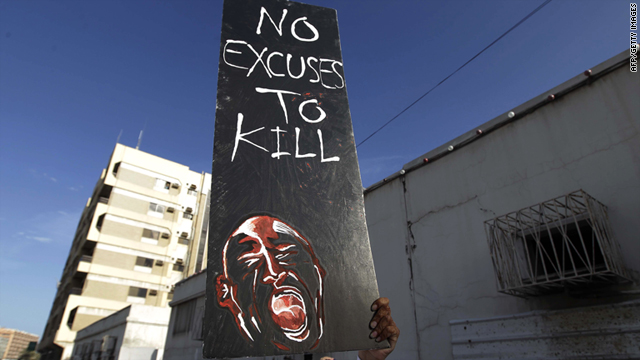by Adom M. Cooper
Impunity Watch Reporter, Middle East
TRIPOLI, Libya–After a visit to the Nafusa Mountains, Human Rights Watch officials claim that the Libyan government forces have placed more than 150 antipersonnel landmines in at least one location. Nafusa Mountains, which lie to the south of Tripoli, have been the site of rebel advances against the government’s troops.

Human Rights Watch reported on six total locations in Libya where regime forces had lain five different types of landmines. Steve Goose, arms director for the advocacy group, shared these sentiments concerning the landmines:
“These antipersonnel landmines pose a huge threat to civilians. More than 150 countries have banned landmines, but Libya continues to defy this global trend. We hope the rebels will respect their promise not to use landmines and will destroy all mines in their possession. The use of antipersonnel mines in the Libya conflict is endangering civilians and will continue to do so after the fighting has stopped.”
The type of landmines found in the Nafusa Mountains are a Brazilian-manufactured antipersonnel mine, known as the T-AB-1. These mines were placed about 10 miles north of the town of Zintan in a location called Khusha, apparently to defend government positions resting further north. The T-AB-1 has a low metal content and is very difficult to detect once placed, especially by civilians who may just be passing through the mountains.
When the Libyan government placed these landmines has yet to be confirmed. Rebels discovered the mines around 1 June 2011 and removed 169 of them, with Human Rights Watch inspecting the disassembled mines.
Civilians in the Nafusa Mountains have reported that they have been driven from their homes, their livestock killed, and their wells poisoned by the regime. Unfortunately, civilians have not just been feeling the heat from the Qadhafi regime. On 18 June 2011, NATO mistakenly destroyed a house in the Libyan capital, killing several residents, and acknowledged responsibility for the deaths. This marked this first time that NATO has admitted to causing multiple civilian casualties.
Italy’s foreign minister, Franco Frattini, expressed these thoughts about the NATO strike that took Libyan civilian lives.
“NATO is endangering its credibility; we cannot risk killing civilians. We cannot continue our shortcomings in the way we communicate with the public, which does not keep up with the daily propaganda of Qadhafi.”
It is blatantly evident that the ongoing conflict in Libya is costing its civilians their homes, access to basic resources, and even their lives. While NATO attempts to get control of the situation through its bombings, the civilians of Libya seem to be the only ones paying the price. It is a classic case of escalation: Qadhafi attacks his own population; NATO bombs to get Qadhafi’s attention; Qadhafi regime places landmines.
But those primarily affected have absolutely nothing to do with the escalating. They are simply trying to live their lives in peace.
For more information, please see:
The Guardian-Libya: Gaddafi regime accused of laying landmines-21 June 2011
Human Rights Watch-Libya: Government Using Landmines in Nafusa Mountains-21 June 2011
News24-Army laying mines near Tripoli-21 June 2011
Al-Jazeera-Libyan civilian deaths ‘sap NATO credibility’-20 June 2011
New York Times-NATO Admits Missile Hit a Civilian Home in Tripoli-19 June 2011

